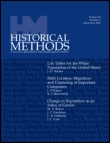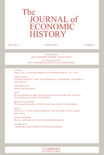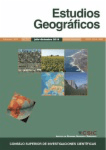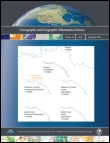
HISTORICAL METHODS
Scope & Guideline
Transforming Historical Analysis through Rigorous Methodologies
Introduction
Aims and Scopes
- Quantitative Historical Analysis:
The journal frequently publishes studies that incorporate quantitative methods to analyze historical data, exploring trends in demography, economics, and social structures. - Digital Humanities and Data Visualization:
A significant emphasis on digital tools and methodologies is evident, with contributions focusing on the digitization of historical documents, the use of Geographic Information Systems (GIS), and data visualization techniques to enhance historical scholarship. - Interdisciplinary Approaches:
The journal encourages interdisciplinary research, integrating insights from economics, sociology, environmental studies, and public health to provide a more nuanced understanding of historical phenomena. - Archival Research and Primary Data Collection:
Many articles highlight the importance of archival research, showcasing new datasets and methodologies for collecting and analyzing historical data, thereby enriching the field with primary sources. - Environmental and Climate History:
There is a growing interest in environmental history, particularly in how climate and ecological factors have influenced human societies throughout history.
Trending and Emerging
- Environmental History and Sustainability:
Recent publications increasingly address environmental issues, emphasizing historical perspectives on climate change, sustainability, and ecological impacts on societies, highlighting the relevance of historical analysis in contemporary discussions. - Data-Driven Historical Research:
There is a notable trend towards employing advanced data analysis techniques, including machine learning and statistical methods, to unlock insights from historical datasets, enhancing the rigor and depth of historical research. - Social History and Inequality:
Research focusing on social structures, class dynamics, and historical inequalities has gained traction, reflecting a broader societal concern with understanding the roots and impacts of inequality throughout history. - Digitization and Archival Innovation:
The trend of digitizing historical records and creating new databases is increasingly prominent, facilitating new avenues for research and making historical data more accessible for analysis. - Quantitative Approaches to Economic History:
The integration of quantitative methods in economic history is on the rise, with studies examining historical economic trends, trade patterns, and the socio-economic impacts of historical events.
Declining or Waning
- Traditional Narrative History:
There seems to be a waning interest in purely narrative-driven historical accounts, as the journal increasingly favors data-driven and methodological approaches that provide empirical evidence over anecdotal storytelling. - Purely Descriptive Studies:
Studies that focus solely on descriptive historical accounts without engaging in quantitative analysis or methodological innovation are becoming less common, reflecting a shift towards research that leverages data and analytical frameworks. - Localized Case Studies:
While localized historical studies have been a staple, there is a noticeable decline in their frequency as broader, comparative, and transnational studies gain traction in addressing historical questions.
Similar Journals

Tuna-Ajalookultuuri Ajakiri
Advancing Knowledge in History and Information SciencesTuna-Ajalookultuuri Ajakiri, published by RAHVUSARHIV-NATL ARCH ESTONIA, is a prominent Estonian journal focusing on History and Library and Information Sciences. With an ISSN of 1406-4030, this journal aims to disseminate valuable insights and scholarly research that contributes to the understanding of cultural history and information management practices, particularly within the Estonian context. Despite its recent classification in the Q4 quartile for both domains in 2023, it serves as a crucial platform for emerging scholars and seasoned researchers alike, fostering dialogue and collaboration in its fields. Covering publications from 2011-2014 and then resuming from 2017-2022, the journal seeks to bridge gaps in historical narratives and enhance the academic discourse surrounding library sciences. While it currently does not offer an open access model, it remains a key reference point for those pursuing in-depth studies in these crucial areas of academia.

Journal of History-NCCU
Connecting Historians Across DisciplinesThe Journal of History-NCCU is a prestigious academic publication produced by the Department of History at National Chengchi University in Taipei, Taiwan. With the ISSN 0301-9667, this journal serves as a vital platform for scholars and researchers dedicated to the exploration of historical narratives, methodologies, and interpretations, enriching the global discourse in the field of history. The journal emphasizes interdisciplinary approaches, welcoming contributions that intersect with cultural studies, sociology, and political science, thereby appealing to a broad audience of historians, professionals, and students alike. Although it does not currently offer Open Access options, the Journal of History-NCCU maintains a commitment to academic excellence, ensuring that its articles undergo thorough peer review to uphold rigorous scholarly standards. This journal is crucial for those seeking to deepen their understanding of historical contexts and engage with contemporary historiographical debates, positioning itself as an essential resource for advancing historical scholarship.

ZEITSCHRIFT FUR HISTORISCHE FORSCHUNG
Unpacking the Past: A Platform for Rigorous ScholarshipZEITSCHRIFT FUR HISTORISCHE FORSCHUNG, published by DUNCKER & HUMBLOT GMBH, is a significant journal in the field of history based in Germany. With ISSN 0340-0174 and E-ISSN 1865-5599, this journal has been a crucial platform for disseminating historical research since 1989 and has evolved through several converged years, capturing a myriad of perspectives on historical discourse. While currently positioned in the fourth quartile (Q4) of the History category according to Scopus rankings, it serves as an important repository for emerging historians and seasoned researchers alike, stimulating scholarly conversation and advancing historical methodologies. Despite its challenges, the journal remains dedicated to offering a platform for rigorous academic inquiry, ensuring that its contributions continue to enrich the tapestry of historical scholarship. Although it does not offer Open Access options, its commitment to quality and scholarly rigor makes it indispensable for those engaged in the study of history.

Revista de Historia-Sao Paulo
Charting New Paths in Historical Understanding.Revista de Historia-Sao Paulo, an esteemed academic journal published by UNIV SAO PAULO, FAC FILOSOFIA LETRAS & CIENCIAS HUMANAS, has been a key platform for historical research since its inception in 1950, offering open access to a diverse array of scholarly articles. Based in Brazil, this journal delivers a critical perspective on historical studies, contributing to the broader discourse within the field. With an ISSN of 0034-8309 and an E-ISSN of 2316-9141, it has established a notable presence in academia, ranking within the Q2 quartile for its contributions to history as of 2023. The journal's impact is underscored by its inclusion in Scopus, with a rank of 1103/1760 in the Arts and Humanities category. Covering converged years that span from 1968 to 2024, the journal caters to a wide scholarly community and facilitates the dissemination of pioneering research. Its commitment to making historical resources accessible accentuates its relevance and importance to researchers, professionals, and students alike.

JOURNAL OF ECONOMIC HISTORY
Unraveling the Tapestry of Economic ChangeJOURNAL OF ECONOMIC HISTORY, published by Cambridge University Press, is a renowned academic platform dedicated to the exploration and analysis of economic history from its inception in 1941 through the forthcoming decades. With its ISSN 0022-0507 and e-ISSN 1471-6372, this journal occupies a prestigious place in the field, as evidenced by its impressive Q1 rankings in both Economics and Econometrics and History categories for 2023. It is positioned among the top tier of journals, ranking #42 out of 1760 in the Arts and Humanities (History) and #75 out of 242 in Economics, Econometrics, and Finance (Miscellaneous) according to Scopus metrics. The journal's rigorous peer-reviewed articles aim to bridge theoretical frameworks with empirical research, fostering an understanding of historical economic dynamics and their relevance in contemporary society. Although the journal does not offer open access, it continues to serve as an essential resource for researchers, professionals, and students aiming to deepen their knowledge and contribute to critical discussions within the fields of economics and history. The journal publishes diverse articles that engage critically with both primary and secondary sources, ensuring that its contributions remain impactful and influential within the academic community.

Estudios Geograficos
Unveiling Earth's Processes Through Open Access ResearchEstudios Geograficos, a prominent journal published by the CONSEJO SUPERIOR INVESTIGACIONES CIENTIFICAS-CSIC in Spain, serves as a vital platform for advancing the fields of geography and earth-surface processes. With an ISSN of 0014-1496 and E-ISSN of 1988-8546, the journal has been committed to Open Access since 1996, ensuring that its valuable research is accessible to a global audience. Recognized as a Q3 journal in both Earth-Surface Processes and Geography, Planning and Development, it plays a crucial role in shaping understanding and policy related to our planet. As of 2023, it holds a respectable rank of 562nd in Social Sciences Geography and maintains a percentile standing, reflecting its significance within the academic community. Covering a diverse range of topics, Estudios Geograficos aims to foster scholarly dialogue and disseminate innovative interdisciplinary findings, providing researchers, professionals, and students with critical insights and tools to address contemporary geographic challenges.

Ajalooline Ajakiri-The Estonian Historical Journal
Engaging Minds, Enriching HistoriesAjalooline Ajakiri - The Estonian Historical Journal, published by the esteemed Univ Tartu Press, is a key contributor to the field of history, providing insights and analyses that are pertinent to both local and global historical discourse. With an ISSN of 1406-3859 and E-ISSN 2228-3897, this journal aims to promote the study and appreciation of Estonian history while also contextualizing it within broader historical narratives. Despite its current categorization in the Q4 quartile for 2023, ranking #1441 out of 1760 in the arts and humanities history sector, it serves as an essential platform for emerging scholars and seasoned academics alike, seeking to foster dialogue and collaboration across various historical disciplines. Although currently not open access, the journal continues its mission to present high-quality research and critical reviews that engage with the complexities of historical scholarship. Established in 1999, the journal has undergone several convergences, with its latest consistent publication span from 2015 to 2023, marking its responsiveness to the evolving needs of the academic community.

Yearbook of Phraseology
Bridging Theory and Practice in PhraseologyThe Yearbook of Phraseology, published by Walter de Gruyter GmbH, is an influential academic journal centered on the study of phraseology within the fields of linguistics and communication. With an ISSN of 1868-632X and an E-ISSN of 1868-6338, this journal showcases cutting-edge research from 2014 to 2023, emphasizing both theoretical and practical implications of phraseological studies. Notably ranking in the Q3 category for both Communication and Linguistics and Language, it holds a respectable position within the academic community, as indicated by its Scopus rankings which place it within the 63rd percentile for Language and Linguistics. The Yearbook of Phraseology serves as a vital resource for researchers, professionals, and students eager to explore the intricate relationships between language and communication through the lens of phraseology, making significant contributions to scholarly discourse in these dynamic fields.

Herald of an Archivist
Preserving History, One Archive at a TimeHerald of an Archivist is a distinguished journal published by the Russian Society Historians & Archivists, dedicated to advancing the field of archival studies and historical documentation. With an ISSN of 2073-0101, this journal seeks to foster scholarly dialogue among archivists, historians, and researchers interested in preservation practices, archival theory, and the critical role archives play in understanding and documenting history. Despite being categorized under a non-open access model, the journal maintains rigorous academic standards, evidenced by its ongoing contribution to the discourse surrounding archival ethics and methodologies. Though specific metrics such as HIndex and Scopus rankings are unavailable, Herald of an Archivist is anticipated to be a valuable resource for professionals seeking to deepen their understanding of archival practices in a global context, promoting innovative research and practical applications in the field.

Cartography and Geographic Information Science
Elevating Research in Cartography and Spatial SciencesCartography and Geographic Information Science is a premier journal published by Taylor & Francis Inc, focusing on the interdisciplinary realms of geography, planning, and technological innovation. With an impressive impact factor and ranking in the top quartiles across various categories, including Q1 in Geography, Planning and Development and Q2 in Civil and Structural Engineering, this journal serves as an essential resource for researchers, professionals, and students alike, promoting cutting-edge research and advancements in cartography and geographic information systems. The journal disseminates high-quality articles that explore both theoretical and practical aspects of geographic information, aiming to enhance the understanding and application of spatial data. As the field evolves, Cartography and Geographic Information Science remains a vital forum for innovation and scholarly dialogue, offering accessible content to a global audience. With its commitment to rigor and relevance, it plays a critical role in advancing the landscapes of geography and environmental sciences.